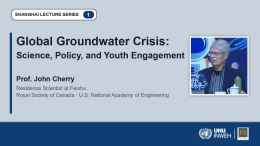United Nations (UN) system entities have received the message. They need to implement an environmental management system (EMS) by 2025. Greening the Blue Report 2022 — The UN system’s environmental footprint and efforts to reduce it, which provides 2021 data and was published on 14 December 2022, shows entities are ramping up their efforts to meet the 2025 deadline.
In comparison to 2020, double the number of UN entities meet the requirements of an EMS in 2021. As well, more entities are approaching the requirements; a two per cent increase in those approaching was seen between 2020 and 2021. A total of 33% of UN entitles met or approached the 2025 target.
Related to EMS, and a key aspect of environmental governance are environmental and social safeguards and standards (ESS). Here too UN entities have improved their efforts between 2020 and 2021, resulting in a five per cent increase of entities that have ESS in their policies, projects and programmes.
The annual Greening the Blue Report provides UN system-wide data on the management functions and environmental impact areas identified in the Strategy for Sustainability Management in the United Nations System 2020-2030, Phase I: Environmental Sustainability in the Area of Management (Sustainability Strategy I). In recognition of the importance of an EMS, the Sustainability Strategy I established a separate targeted deadline for implementing one from the rest of its indicators. The rest of the indicators have a targeted deadline of 2030. It is understood that an EMS is a vital mechanism for achieving the other indicators and therefore must be implemented first.
Environmental management is integrated with existing UN capacity-building and accountability frameworks. This objective is supported by the commitment to increased understanding and capacity among UN personnel to ‘walk the talk.’ Capacity-building, therefore, plays a critical role in transitioning operations and management for a more sustainable UN, which is why the Sustainability Strategy I indicates each entity should deliver environmental training to personnel.
Between 2020 and 2021, there was a six per cent increase in entities providing voluntary training and a nine per cent increase in entities making it mandatory for all personnel. In 2021, a total of 46% of entities have environmental training available for staff.
United Nations Environment Programme, in partnership with United Nations Development Programme, has made an online, animated video-based training on environmental sustainability available for free to the entire UN system and externally. It is available in English, French and Spanish at greeningtheblue.org/tutorial.
The full Greening the Blue Report 2022 and UN entity-specific data are available online at www.greeningtheblue.org The Report highlights the environmental impacts of over 307,000 personnel in 53 reporting entities across Headquarters, field offices and operations on the ground.
Additional 2021 data highlights include:
- Greenhouse gas emissions continued to trend downwards in 2021, with the UN system producing ~1.2 million tonnes CO2eq, with per capita emissions of 4 tonnes CO2eq. This is a ~0.3 million tonnes CO2eq total emissions and 1 tonne CO2eq per capita emissions reduction from 2020.
- The UN system’s emissions by source were 29% from air travel, 56% from facilities, and 15% from other forms of travel. The impact of COVID-19 travel restrictions in 2021 are likely reflected in the reduced share of emissions from air travel compared to previous years.
- The average waste generated for the whole UN system was 316 kg/person. This is a reduction of 80 kg/person from 2020.
- The average water consumption by the UN System in 2021, was 37 m3 per UN personnel per year, which is a 1 m3 reduction from 2020.
More information
For more information on the methodologies and data collection used, please visit greeningtheblue.org/methodology.
For more information on the methodology related to travel emissions provided by the International Civil Aviation Organisation please visit the ICAO website.
For information on climate neutrality, please visit the UNFCCC website.



